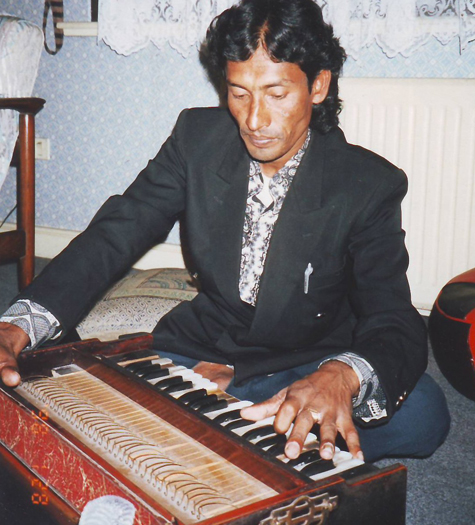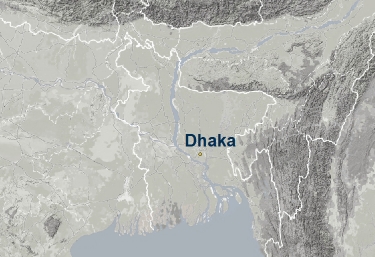Dhaka, Bangladesh. 24 December 2004. Ali Akbar
Ali Akbar, a young folk singer from Kushtia, arrived at the home of my filmmaker friends Tareque and Catherine Masud, in Dhaka on this December night when I was staying with them. He had come to the capital to take part in some cultural event. The folk music collector, singer and radio and TV producer, Mustafa Zaman Abbasi, son of the famous singer Abbasuddin, often summoned him to Dhaka for performances.
Ali Akbar appeared self-absorbed, even temperamental, and when Tareque requested him to sing, he said he wasn’t feeling good about his voice. Moreover, he showed his displeasure with the harmonium that was there in the house. Bellowing with his left hand, as he ran his right-hand fingers over the reeds, they kept getting stuck, causing the singer some frustration. I understood the importance of the harmonium once he started to sing.

Ali Akbar
Ali Akbar sang two compositions of the famous twentieth century bichchhed composer and kobiyal (singer of kobigan or narrative-argumentative song), Bijoy Sarkar and one of Bijoy Sarkar’s disciples, Rasik Sarkar. His style of singing was highly ornamental, verging on the semi-classical. The harmonium plays an important role in this style of singing, adding embellishment to the vocal line, filling each and every gap with clusters of notes. Bijoy Sarkar’s bichchhed gaan or his songs of separation have an intensity about them, whoever the singer might be. To this was added Ali Akbar’s own intensity. He sounded almost like the urban singer of baithaki gaan (songs of nineteenth century Kolkata in which Bengali folk, kirtan and north Indian classical styles come together), despite his rural diction. Ali Akbar was also not happy to sing without the dhol and so he stopped at just three songs and left.
Interestingly, a year and a half later, we met a very different Ali Akbar in his village home in Dakshin Bhabainpur, surrounded by family, friends and other musicians. That evening him and his friends had put up a real show for us and there were people all around who had come to listen, filling up his courtyard, even perched on branches of trees. Ali Akbar played the dotara and danced as he sang songs of Bijoy Sarkar and Lalon—two composers from neighbouring regions of now western Bangladesh, with distinctly different styles of composition. Ali Akbar, however, presented them as his own, with his own ornamentations. This, despite living in Kushtia where Lalon Fokir’s shrine is and from where austere styles such as Binoy Nath’s (whom we recorded in Faridpur) or Khoda Baksh Shah song’ (recorded by Carol Salomon in Santiniketan) have emerged.
Written in 2010.
- Saptiguri, North Bengal. 27 November 2003. Nirmala Roy
- Bolpur, Birbhum. 25 November 2003. Nimai Chand Baul
- Kolkata. 4 September 2019. Purnadas on Nabani Das Baul
- Surma News Office, Quaker Street, East London. 27 February 2007. Ahmed Moyez
- Ambikapur, Faridpur, Bangladesh. 29 April 2006. Hajera Bibi
- Sylhet, Bangladesh. 22 April 2006. Chandrabati Roy Barman and Sushoma Das
- Sylhet, Bangladesh. 21 April 2006. Arkum Shah Mazar
- Sylhet, Bangladesh. 20-21 April 2006. Ruhi Thakur and others
- Jahajpur, Purulia. 27 February 2006. Naren Hansda and others
- Faridpur, Bangladesh. 24 January 2006. Binoy Nath
- Uttar Shobharampur, Faridpur, Bangladesh. 22 January 2006. Ibrahim Boyati
- Baotipara, Faridpur, Bangladesh. 21 January 2006. Kusumbala Mondal and others
- Kumar Nodi, Faridpur, Bangladesh. 21 January 2006. Idris Majhi and Sadek Ali
- Debicharan, Rangpur, Bangladesh 18 January 2006 Anurupa Roy & Mini Roy, Shopon Das
- Mahiganj, Rangpur, Bangladesh. 17 January 2006. Biswanath Mahanta & Digen Roy
- Chitarpur, Kotshila, Purulia. 28 November 2005. Musurabala
- Krishnai, Goalpara, Assam. 30 August 2005. Rahima Kolita
- Chandrapur,Cachar. 28 August 2005. Janmashtami
- Silchar, 25 August 2005, Barindra Das
- Kenduli,Birbhum. 14 January 2005. Fulmala Dasi
- Kenduli, Birbhum. 13 January 2005. Ashalata Mandal
- Shaspur, Birbhum. 8 January 2005. Golam Shah and sons Salam and Jamir
- Bhaddi, Purulia. 6 January 2005. Amulya Kumar, Hari Kumar
- Srimangal, Sylhet. 27 December 2004. Tea garden singers
- Sylhet, Bangladesh. 26 December 2004. Abdul Hamid
- Dhaka, Bangladesh. 23 December 2004. Monjila
- Changrabandha, Coochbehar. 16 December 2004. Abhay Roy
- Santiniketan, Birbhum 27 Nov 2004 Debdas Baul, Nandarani
- Tarapith, Birbhum. 14 October 2004. Kanai Das Baul


